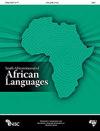Linguistic strategies used by the Ministry of Health and Childcare in Zimbabwe to sensitise citizens on COVID-19
IF 0.4
0 LANGUAGE & LINGUISTICS
引用次数: 0
Abstract
This study explores the use of Shona and English in COVID-19 pandemic adverts by the Ministry of Health and Child Care in Zimbabwe. Specifically, the research establishes and explains the significance of linguistic strategies which were used by the Ministry of Health and Child Care when disseminating information to reduce the risk of COVID-19 infection, spread and management in the print media. The purpose of the study is to demonstrate that language use in this context is an act of cognitive manipulation where the reader is strategically coerced to take up the message. The study is a qualitative research enterprise and it used document analysis as the method of data collection. Data is analysed using Discourse Analysis and conceptual metaphor theory. The study established that the Ministry of Health and Child Care employed metaphors, slang, code switching, interrogatives, translation and borrowing to guide interpretation and conceptualisation of information in their adverts. The study concludes that by using these devices, the ministry exploits shared knowledge and then appeals to cognition through interrogatives to subtly garner support, manipulate opinion and manufacture compliance through the adverts.津巴布韦卫生和儿童保育部为提高公民对新冠肺炎的认识而使用的语言策略
本研究探讨了津巴布韦卫生和儿童保健部在新冠肺炎大流行广告中使用Shona和英语的情况。具体而言,该研究确立并解释了卫生和儿童保健部在传播信息时使用的语言策略的重要性,以降低新冠肺炎在印刷媒体中感染、传播和管理的风险。本研究的目的是证明在这种情况下使用语言是一种认知操纵行为,在这种行为中,读者被战略性地强迫接受信息。本研究是一项定性研究,采用文献分析作为数据收集方法。运用语篇分析和概念隐喻理论对数据进行分析。该研究表明,卫生和儿童保健部使用隐喻、俚语、代码转换、疑问句、翻译和借用来指导广告中信息的解释和概念化。该研究得出的结论是,通过使用这些设备,该部利用共享的知识,然后通过询问来吸引认知,通过广告巧妙地获得支持、操纵意见并制造合规性。
本文章由计算机程序翻译,如有差异,请以英文原文为准。
求助全文
约1分钟内获得全文
求助全文
来源期刊

South African Journal of African Languages
LANGUAGE & LINGUISTICS-
CiteScore
0.50
自引率
0.00%
发文量
30
期刊介绍:
The South African Journal of African Languages is a peer-reviewed research journal devoted to the advancement of African (Bantu) and Khoi-San languages and literatures. Papers, book reviews and polemic contributions of a scientific nature in any of the core areas of linguistics, both theoretical (e.g. syntax, phonology, semantics) and applied (e.g. sociolinguistic topics, language teaching, language policy), and literature, based on original research in the context of the African languages, are welcome. The journal is the official mouthpiece of the African Language Association of Southern Africa (ALASA), established in 1979.
 求助内容:
求助内容: 应助结果提醒方式:
应助结果提醒方式:


